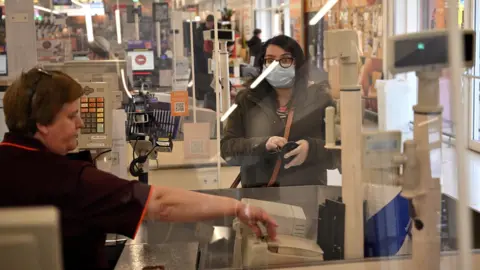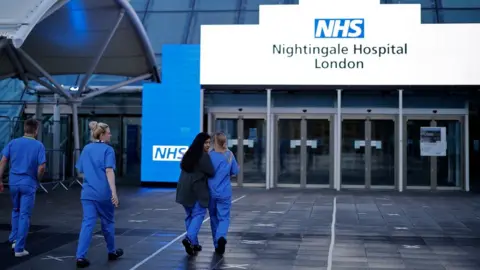Coronavirus: Possible post-lockdown workplace rules revealed
 Getty Images
Getty ImagesReduced hot-desking and alternatives to social distancing where it is not possible are among measures being considered to let workplaces reopen.
One of seven draft plans to ease anti-coronavirus restrictions, seen by the BBC, also urges employers to minimise numbers using equipment, stagger shift times and maximise home-working.
PM Boris Johnson is to reveal a "roadmap" out of lockdown on Sunday.
But the UK must not lift restrictions too soon, he said in a video message.
In the video, posted on Twitter, Mr Johnson said: "The worst thing we could do now is ease up too soon and allow a second peak of coronavirus."
Mr Johnson said the UK would only be able to move on to "the second phase of this conflict" when the government's five tests had been met, including a sustained and consistent fall in daily deaths and being confident any adjustments would not risk a second peak which could overwhelm the health service.
The BBC has seen one of seven draft documents which says additional hygiene procedures, physical screens and the use of protective equipment should be considered where maintaining distancing of 2m (6ft) between workers is impossible.
However, the section marked PPE contains only a promise that "more detail" will follow.
The guidance covers the whole of the UK - but devolved governments have the power to make their own decisions on how businesses get back to work.
The other draft documents, which have been seen by BuzzFeed News, cover guidance for workplace settings including hotels and restaurants.
Under the guidelines bar areas and seated restaurants and cafes must be closed, according to BuzzFeed.
Defence Secretary Ben Wallace told BBC Breakfast protective screens, like those used at some supermarket checkouts, PPE and coronavirus testing could be used to make people feel safe in workplaces if it was "vital" they worked close to each other.
Many companies have been shut since widespread limits on everyday life were imposed on 23 March, in a bid to limit the effects of the virus's spread on the NHS.
Ministers are obliged to review those restrictions by Thursday.
First Minister Nicola Sturgeon said it is "very likely" the Scottish government will continue lockdown measures beyond a scheduled review on Thursday.
Speaking at her daily briefing, Ms Sturgeon said the infection rate is still too high to make "any meaningful change".
She added that while work would be done to ensure there is alignment with the rest of the UK, divergence in measures could still be possible.

How might workplaces reopen with social distancing?
Finnebrogue Artisan, which makes sausages and bacon in Downpatrick, Northern Ireland, has kept operating throughout the pandemic.
Director Declan Ferguson told BBC Radio 4's Today programme it was "totally doable" for other companies to reopen.
He said they had introduced physical markers to keep staff 2m apart, take workers' temperatures when they arrive, and issue them with masks and visors on the factory floor.
Doors are kept open wherever possible to reduce the number of things staff need to touch, and social distancing marshals ensure the rules are being followed.

It is not yet clear when schools could return to help more parents go back to work.
However, the Guardian reports that government scientific advisers are examining the impact of letting children in their final year of primary school return to classrooms from 1 June, as part of a phased reopening of schools.

- A SIMPLE GUIDE: How do I protect myself?
- AVOIDING CONTACT: The rules on self-isolation and exercise
- WILL I GET PAID IF I CAN'T WORK? Rules on sick pay, wages and time off
- PUBLIC TRANSPORT: Is it safe to travel?
- TESTING: Can I get tested for coronavirus?

The number of coronavirus-related deaths in the UK stands at 28,446 - an increase of 315 on Saturday's figure - with 14,248 people currently being treated in hospital.
However, admissions have fallen, along with the number of critical care beds being used.
On Monday, a further 204 deaths were announced in England, along with five more in Scotland and 14 more in Wales.
The latest UK-wide figures - which use a different timeframe to those of individual nations - will be published later.
The prime minister will examine data, take advice on how much the virus has been suppressed and assess the potential consequences on infection rates of changes to rules, before setting out plans next Sunday.
Responses received last night to the draft workplace guidelines from companies, business groups and unions will also be taken into account.
Rail unions have written to Boris Johnson expressing concerns about plans by operators to increase the number of trains in service as more people potentially return to work.
"We will not accept new working patterns that put the lives of railway workers and passengers at risk," says the joint letter from ASLEF, RMT and TSSA.
 Getty Images
Getty ImagesMeanwhile, London's NHS Nightingale hospital is expected to take no new patients and be placed on standby in the coming days.
The ExCel Centre was turned into a 4,000-bed facility to increase the NHS's capacity for treating patients with Covid-19.
In a briefing to staff, the hospital's chief executive said it was "likely" the hospital would not need to admit patients in the coming days while the virus remained under control in London.
The BBC understands fewer than 20 people are currently being treated there and once they have been discharged the hospital will be placed on standby and staff and PPE will be redeployed and redistributed.
In other developments:
- A partial list of the membership of the scientific advisory group for emergencies (Sage), which is helping shape the government's response to the pandemic, has been published by the government, following calls for transparency
- Labour is urging the government to plan to stockpile masks, in case official advice on wearing them changes
- Businesses including sole traders and limited companies are able to apply for "bounce-back" loans of £2,000 to £50,000, 100% guaranteed by the government
- Boris Johnson will urge countries to "pull together" and share expertise as he co-hosts an international conference to drive the race for coronavirus treatments, tests and vaccines
- University students in England must pay full tuition fees even if courses are taught online in the autumn, the government says
- France, Italy and Spain register their lowest daily death tolls for weeks as they prepare to ease restrictions

How have you been affected by coronavirus? Share your experiences by emailing [email protected].
Please include a contact number if you are willing to speak to a BBC journalist.
- WhatsApp: +44 7756 165803
- Tweet: @BBC_HaveYourSay
- Send pictures/video to [email protected]
- Upload your pictures / video here
- Please read our terms & conditions and privacy policy
